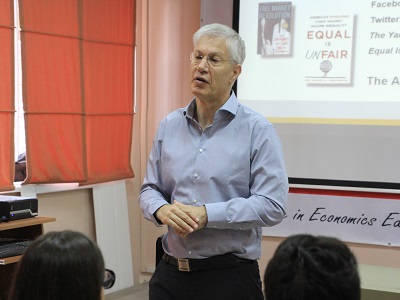In the world of the 21st century, the number of people living without electricity in their homes is 1.3 billion. Even among those who have access, many do not own basic assets such as refrigerators, motorized transport, or washing machines. However, it is anticipated that over the next several decades, wide-scale poverty alleviation programs, as well as continued economic growth, will lift the incomes of many of the world’s poor. As incomes increase, families formerly living in poverty will for the first-time purchase energy-using assets.
How will the global demand for energy rise as a consequence? To answer that question, Dr. Alan Fuchs, Senior Economist in the Poverty and Equity Global Practice of the World Bank, made a presentation at ISET on October 5th.
On September 7, ISET hosted the president and executive chairman of the Ayn Rand Institute, Dr. Yaron Brook, for a presentation. The topic of the presentation was Free Speech and The Battle for Western Culture. During the presentation, Dr. Brook explained why and in what ways free speech is under attack and why it is important to defend this fundamental right.
At the beginning of the presentation, Dr. Brook highlighted that free speech is a core value of civilization, and is what Western civilization stands for. One of the most important events in the history of civilization was the adoption of the Declaration of Human Rights, the first political document that recognizes human rights. However, he claimed that there has been years is an obvious restriction of free speech in recent years: Newspapers cannot publish cartoons relevant to the news, just because they fear violent reprisals; Dr. Brook also claimed there were even greater restrictions of free speech at universities, which cannot invite speakers if the guests do not hold common political views.
On the 25th of May, ISET was pleased to host the environmental economist and founder of the consultancy company GIST Advisory, Pavan Sukhdev, for a presentation. Starting his career as a physicist, Mr. Sukhdev got interested in the challenges of environment protection. This led him to investigate economics, particularly aiming at understanding the significance of businesses as a driver of the changes that we see around us as well as third party impacts, which are known as externalities in economics. Mr. Sukhdev highlighted corporate externalities as being the “biggest free lunch in human history”. Created by private companies, externalities cause huge damages. Companies earn profits at the expense of public losses, reaching from 10 to 15 trillion dollars or 15-20% of global GDP. A study by the NGO “Trucost” found that in 2010 five sectors, namely electricity, oil and gas, industrial metals and mining, food and construction are responsible for about 60% of environmental cost. Yet, as pointed out by Mr. Sukhdev, the private sector operates in the scope of legal framework and can therefore be influenced and regulated by the society.













